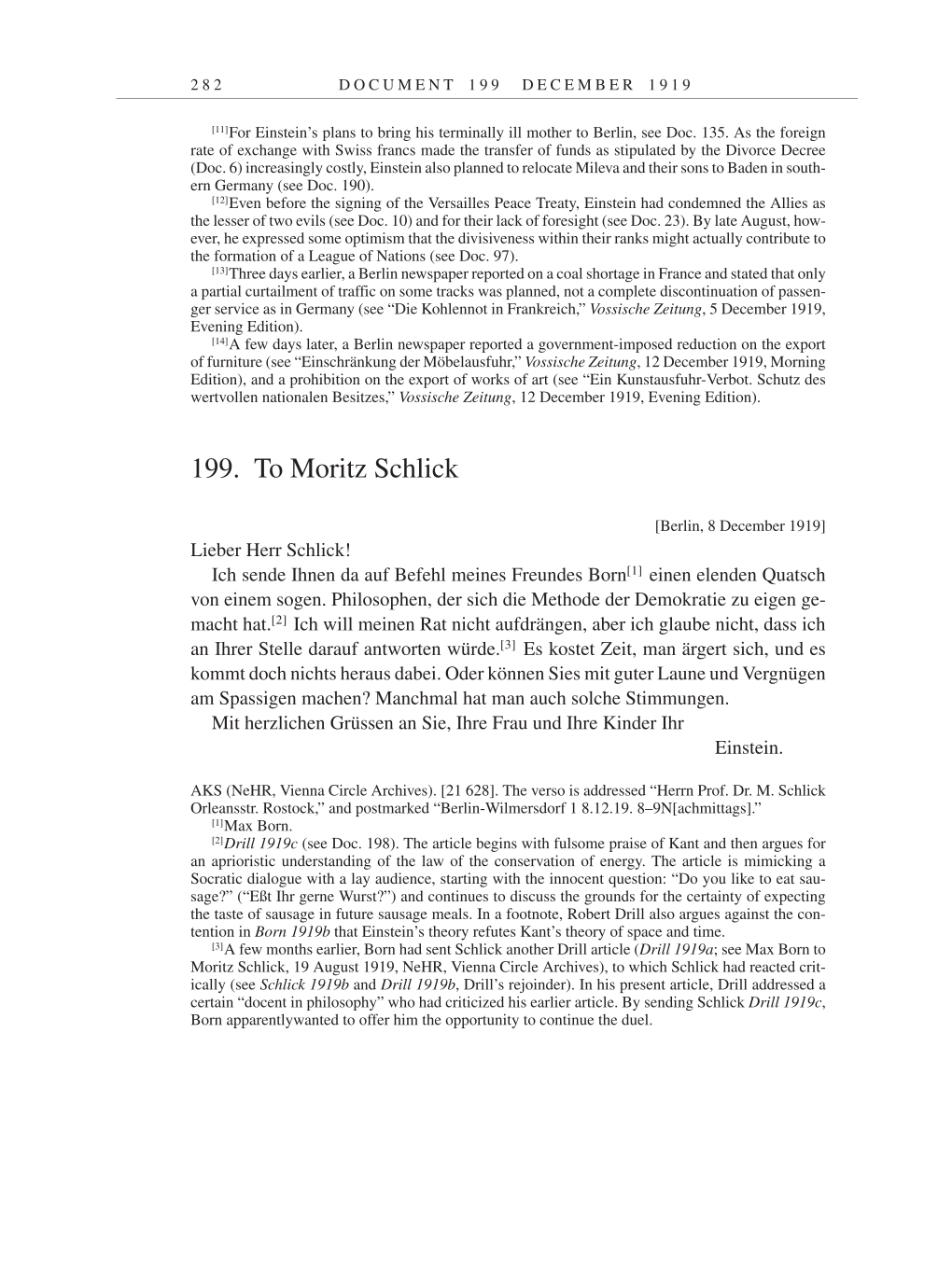2 8 2 D O C U M E N T 1 9 9 D E C E M B E R 1 9 1 9
[11]For Einstein’s plans to bring his terminally ill mother to Berlin, see Doc. 135. As the foreign
rate of exchange with Swiss francs made the transfer of funds as stipulated by the Divorce Decree
(Doc. 6) increasingly costly, Einstein also planned to relocate Mileva and their sons to Baden in south-
ern Germany (see Doc. 190).
[12]Even before the signing of the Versailles Peace Treaty, Einstein had condemned the Allies as
the lesser of two evils (see Doc. 10) and for their lack of foresight (see Doc. 23). By late August, how-
ever, he expressed some optimism that the divisiveness within their ranks might actually contribute to
the formation of a League of Nations (see Doc. 97).
[13]Three days earlier, a Berlin newspaper reported on a coal shortage in France and stated that only
a partial curtailment of traffic on some tracks was planned, not a complete discontinuation of passen-
ger service as in Germany (see “Die Kohlennot in Frankreich,” Vossische Zeitung, 5 December 1919,
Evening Edition).
[14]A few days later, a Berlin newspaper reported a government-imposed reduction on the export
of furniture (see “Einschränkung der Möbelausfuhr,” Vossische Zeitung, 12 December 1919, Morning
Edition), and a prohibition on the export of works of art (see “Ein Kunstausfuhr-Verbot. Schutz des
wertvollen nationalen Besitzes,” Vossische Zeitung, 12 December 1919, Evening Edition).
199. To Moritz Schlick
[Berlin, 8 December 1919]
Lieber Herr Schlick!
Ich sende Ihnen da auf Befehl meines Freundes
Born[1]
einen elenden Quatsch
von einem sogen. Philosophen, der sich die Methode der Demokratie zu eigen ge-
macht
hat.[2]
Ich will meinen Rat nicht aufdrängen, aber ich glaube nicht, dass ich
an Ihrer Stelle darauf antworten
würde.[3]
Es kostet Zeit, man ärgert sich, und es
kommt doch nichts heraus dabei. Oder können Sies mit guter Laune und Vergnügen
am Spassigen machen? Manchmal hat man auch solche Stimmungen.
Mit herzlichen Grüssen an Sie, Ihre Frau und Ihre Kinder Ihr
Einstein.
AKS (NeHR, Vienna Circle Archives). [21 628]. The verso is addressed “Herrn Prof. Dr. M. Schlick
Orleansstr. Rostock,” and postmarked “Berlin-Wilmersdorf 1 8.12.19. 8–9N[achmittags].”
[1]Max Born.
[2]Drill 1919c (see Doc. 198). The article begins with fulsome praise of Kant and then argues for
an aprioristic understanding of the law of the conservation of energy. The article is mimicking a
Socratic dialogue with a lay audience, starting with the innocent question: “Do you like to eat sau-
sage?” (“Eßt Ihr gerne Wurst?”) and continues to discuss the grounds for the certainty of expecting
the taste of sausage in future sausage meals. In a footnote, Robert Drill also argues against the con-
tention in Born 1919b that Einstein’s theory refutes Kant’s theory of space and time.
[3]A few months earlier, Born had sent Schlick another Drill article (Drill 1919a; see Max Born to
Moritz Schlick, 19 August 1919, NeHR, Vienna Circle Archives), to which Schlick had reacted crit-
ically (see Schlick 1919b and Drill 1919b, Drill’s rejoinder). In his present article, Drill addressed a
certain “docent in philosophy” who had criticized his earlier article. By sending Schlick Drill 1919c,
Born apparentlywanted to offer him the opportunity to continue the duel.
